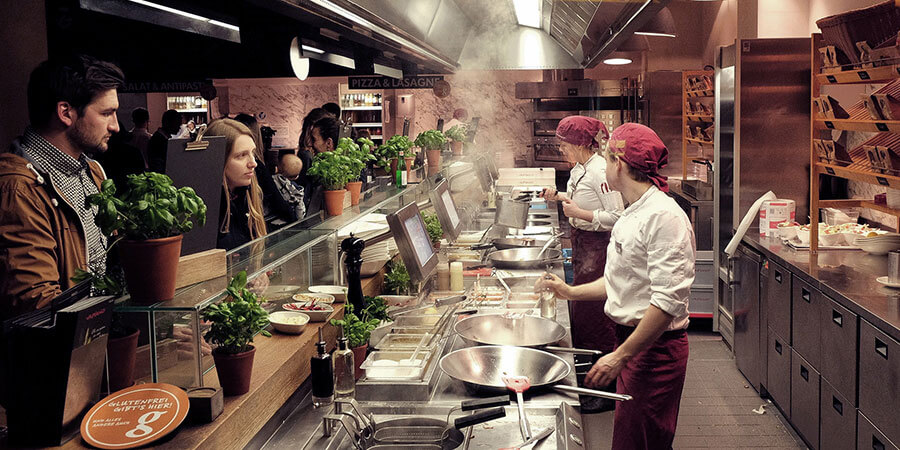The Top 4 Issues Faced By The Foodservice Industry Today

Being in an industry that serves up (pun intended) the most basic of human needs, "food", the foodservice industry has always been at the forefront of innovation. In 2020, this still holds true. Even as food safety practices continue to be refined and updated, along with legislation, the foodservice industry continues to face a number of issues as food technology and consumer trends and demands keep changing.
Some of these issues are left to individual operators to manage while others are addressed through legislation and the presence of trade associations, both local and international. There are a few issues that people face around the world but here are 4 common issues that mom-and-pop restaurants, large restaurant chains, small pizza joints, and larger caterers all have to deal with on a regular basis.
Food Safety
One of the most pressing issues in the foodservice industry is food safety. This is of paramount concern since any mishandling, contamination, or reported food-borne illness is guaranteed to be a major PR nightmare. The foodservice industry’s prime responsibility to consumers is public health and safety.
Modern consumer food trends that catch on quickly (thanks in part to the Internet and social media) have become a breeding ground for food safety-related problems, and food safety professionals should be ready to respond. Consultants must always be on the lookout for food trends to effectively guide food entrepreneurs in implementing safety strategies and protecting their brand.
Those in charge of regulation must keep a watchful eye on food crazes and trends as well as changes in consumer behavior to be able to anticipate the need to review and update the food code to ensure public health and safety.
Frozen vs. Canned and Preserved
Good examples of such food trends include the direct use of frozen fruit in smoothies and frozen vegetables in salads without the benefit of any cooking. These products were originally introduced to ensure that cooks and bakers had seasonal ingredients needed all year long for their recipes which were either cooked or baked. Frozen produce was also considered a minimally processed alternative to its canned or preserved counterparts.
These days, however, restaurants and consumers in their homes use them from their raw frozen state which poses safety concerns since frozen produce is not classified as ready-to-eat (RTE) food. But, how many people actually know this?
If the frozen food industry had been able to predict the novel ways by which their products would be used, they could have adequately prepared by tightening their food safety standards for pathogen tolerance in the process of frozen food production. In 2016, a large-scale voluntary recall of frozen fruits and vegetables sold under numerous brand names took place when ten people were hospitalized (two of whom died) due to this unregulated misuse of frozen produce that people take to be not only harmless but also healthy.
The same goes for the novelty of restaurants featuring edible food gardens from which they sometimes take produce, usually vegetables and herbs, to be used as fresh ingredients for the food they serve. Who’s to say that those guests, who sometimes touch the leaves or produce while they are still in the garden, have clean hands, or have no pathogens on them? That's why you should ensure they are using the proper techniques to keep their hands clean such as requiring disposable kitchen gloves to be worn and for them to be cleaning their hands regularly with hand soap and hand sanitizers!
You also have to keep in mind that people smoke, cough, and sneeze in restaurants, which leads to the question of how these things affect the environment of said edible plants. Therefore if you are set on continuing these practices, you should consider having UV air sanitation products running at all times in your location and/or having a room sanitation fogger & mister on hand, so your staff can keep the building as clean as possible, which will provide your customers with the best experience around town.
Food Labeling
With increasing public awareness regarding food-related health problems like obesity, diabetes, and hypertension, food producers and manufacturers are under mounting public pressure to label their products accordingly.
This is why trans fats and GMO labeling are already in force in some countries. Calorie counting among consumers and the influence of publications such as “Eat This, Not That” by David Zinczenko with Matt Goulding have also induced some restaurants to include caloric information on their menus or, at the very least, provide detailed nutritional information accessible to the public through their websites.
Food Waste
Restaurants, though generally considered to be a “clean industry,” still substantially contribute to the waste stream. Some restaurants have adopted recycling in terms of food packaging, and some fast food companies have reintroduced the use of non-disposable beverages and food containers for dine-in orders. Some restaurants even offer reusable to-go containers for their customers to use!
However, the management of solid waste disposal remains a growing challenge as towns and cities remain ill-equipped to deal with the consequences of higher population density and urbanization.
As the issues listed above illustrate, the more things change - the more they stay the same. While rules and regulations for the Foodservice industry are constantly changing, consumer health and safety remain paramount. By focusing on these four issues you will position your business for success while keeping your customers healthy and happy!
Credits & Resources:
Header Image source - https://www.pexels.com/@marketingtuig/
Compostable & Environment Friendly Dinnerware, Beverageware, & Flatware - World Centric
Share This!